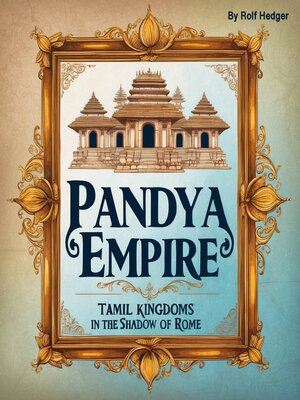
Sign up to save your library
With an OverDrive account, you can save your favorite libraries for at-a-glance information about availability. Find out more about OverDrive accounts.
Find this title in Libby, the library reading app by OverDrive.



Search for a digital library with this title
Title found at these libraries:
| Library Name | Distance |
|---|---|
| Loading... |
The Pandya dynasty was one of the most ancient and influential Tamil kingdoms of South India, with origins deeply rooted in both history and legend. The earliest references to the Pandyas appear in Tamil Sangam literature, which dates back over two thousand years. These texts describe the Pandyas as powerful rulers of Madurai, a city that would become the cultural and political heart of their kingdom. The dynasty's history is intertwined with mythology, particularly in Tamil literary traditions that claim the Pandyas descended from the gods. Some legends suggest that the first Pandya king was Kulasekara Pandya, a ruler said to be divinely blessed by Lord Shiva himself.
Historically, the Pandyas are believed to have established their rule as early as the 6th century BCE, although their presence likely predates this period. The Sangam Age, which spanned from roughly 300 BCE to 300 CE, marks the first well-documented era of Pandya rule. During this time, the kingdom flourished due to its strong trade networks, military strength, and patronage of Tamil poets and scholars. The Pandyas ruled alongside the Chola and Chera dynasties, forming a triad of powerful Tamil polities that competed for dominance in South India. These three kingdoms frequently engaged in alliances, conflicts, and shifting power dynamics that shaped the region's history.
The early Pandyas built their capital in Korkai, an important port city known for its pearl fisheries and maritime trade. However, as their kingdom expanded, Madurai became the political and cultural center of their rule. The Pandyas were known for their patronage of literature and arts, particularly the Tamil Sangam assemblies, where poets and scholars composed some of the most revered works in Tamil history. This period saw the flourishing of Tamil culture, with kings promoting literary works that detailed heroism, love, and governance.







